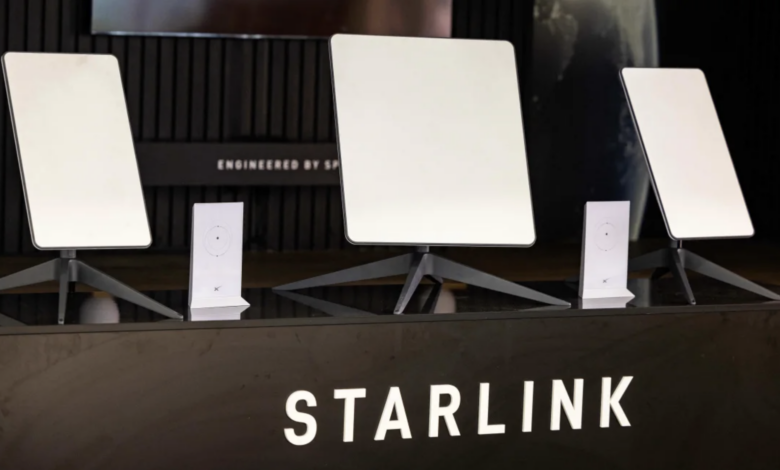
Starlink internet service, operated by Elon Musk’s SpaceX, will be provided to the UAE’s field hospital in southern Gaza for patients needing real-time video medical consultations, the UAE’s foreign ministry said on Wednesday.
Communication services in Gaza have blacked out several times over the past four months, including for more than one week in January – the longest period since the start of the war.
Some journalists and aid workers get limited communications by using international or electronic SIMs, near the Israeli or Egyptian borders, but connection to the outside world has become difficult for the general population.
The Rafah-based hospital – one of the few international field hospitals in Gaza – is staffed by 50 doctors, nurses, pharmacists and lab technicians, and had faced communication difficulties affecting its ability to give patients medical help received through video conference with other hospitals. The UAE, which shares good relations with Israel, is one of the few countries operating a field hospital in Gaza.
“This step further underscores the UAE’s unwavering efforts to stand in solidarity with the brotherly Palestinian people during the ongoing war,” the foreign ministry spokeswoman Afra Al Hameli said.
Starlink, operated by SpaceX, uses a network of thousands of satellites to provide broadband, and can deliver high-speed, low-latency internet to users all over the world, including in areas where conventional internet is unavailable.
Musk, who founded SpaceX, was criticized by Israeli officials in October when he wrote on X that he will provide Starlink to internationally recognized aid organizations in Gaza.
At the time Israeli officials accused Musk of supporting Hamas but shortly after Israel’s communication minister Shlomo Karhi said on X that a “principle understanding” with Musk was reached on Starlink, and that it can only be operated in Israel and Gaza with the approval of the Israeli government.
“Israeli security authorities approved the provision of Starlink services at the UAE’s field hospital operating in Rafah,” the Israeli communication ministry said in a statement on Wednesday.
“Units in the Gaza Strip to support humanitarian causes will be approved individually, only after Israeli security forces confirmed it to be an authorized entity with no concern of risk or possibility of endangering national security,” Karhi said in the statement.
In November, Musk visited Israel, met the country’s leaders and walked through a kibbutz destroyed by Hamas, as he tried to calm outrage caused by his endorsement of an antisemitic post on his social media platform, X.
The use of Musk’s Starlink in international conflict zones has underscored his power and influence as one of the world’s richest people.
Musk has faced criticism over how and where he’s allowed Starlink to be deployed in Ukraine during its war with Russia. And just this week, Ukraine’s Defense Intelligence claimed it had confirmed the use of Starlink satellite communications by Russian forces in occupied areas, although SpaceX says it does not do business with the Russian government or its military.
CNN was the first western media outlet allowed to visit the field hospital in Rafah in December.
Within minutes of CNN’s arrival to the hospital, several people injured by Israeli strikes were brought, including a man and a 13-year-old boy, both with missing limbs due to the bombing. At the time the notes handed over from the paramedics were smeared with blood. The teams worked quickly to replace the bandages that were being used as improvised tourniquets.
The hospital was constructed rapidly in a soccer stadium but its staff and state-of the-art equipment make its 150 beds highly sought after. The hospital has so far performed 555 major surgeries and treated over 4,038 cases in the past months, the foreign ministry said.
Photo credit: Odd Andersen/AFP/Getty Images.




